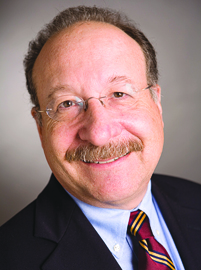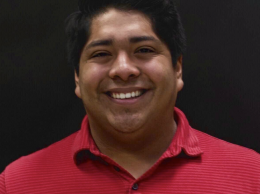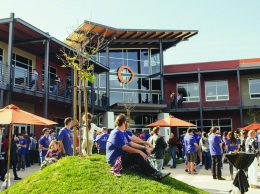Dubroff: UCSB grad school will help tech managers innovate in digital age
IN THIS ARTICLE
- Central Coast Topic
- Henry Dubroff Author
By Henry Dubroff Friday, November 13th, 2015
The Central Coast has a growing reputation as a cool place for startups. But amid dozens of new ventures and talk of a tech-centric future looms the reality of growing a fully functional technology company.
Listening to the earnings calls for AppFolio and MindBody, which recently had successful IPOs, you begin to realize just how big the challenges are. Both companies reported big revenue jumps but also big losses for their first quarters as public companies. Analysts are beginning to ask publicly when the bottom line will turn from red to green.
That’s where Paul Leonardi comes in. On Nov. 9, the Stanford-trained management expert was officially installed as the founding director of the Master of Technology Management program at UC Santa Barbara. His program’s mission is going to be to train a new generation of managers in the art of navigating corporate innovation in the digital age.
“When you are thinking about technology management from the perspective of a startup,” he said in a phone interview, “you have technology that you think can make a difference and you do the appropriate market and business validation.”
That’s the kind of help that UCSB’s TMP program has been providing to undergraduates and student entrepreneurs for years. So have other programs, including the Cal Poly Hot House, which I visited on Nov. 5 in its newly expanded digs downtown.
But for larger enterprises, the challenge of technology management takes on a new dimension. Software companies like AppFolio, MindBody and Citrix or hybrid hardware companies such as medical device makers Inogen, Sientra or audio products giant Sonos are in a different league.
“That’s where the challenge is on the Central Coast,” said Leonardi. At age 36, he’s spent more than a decade helping top executives at GM, Baxalta and others figure out how to succeed in the new digital economy.
“When you have a big organization that’s developing products and must continuously innovate and validate markets, things become much more difficult,” said Leonardi, who admits he’s had an unusual degree of access to large companies and their technology departments over the past decade.
He made an instant impression on a UCSB search committee that had waited years for the right candidate to come along. Already, Leonardi has recruited his Stanford thesis advisor, Stephen Barley, along with Kyle Lewis from the University of Texas and Renee Rottner from NYU.
One of the biggest challenges for larger enterprises, said Leonardi, is managing supply chains so that power and control dynamics create effective partnerships between creative types on the Central Coast and production facilities in Texas or Asia or Latin America. A sometimes unexpected factor for newly public companies is that Wall Street doesn’t always love new products.
“Stockholders want you to build more of what you have and do it cheaper to get higher margins,” he said.
The ecosystem for technology companies on the Central Coast has changed, he argued, advancing well beyond the startup era thanks in large part to an expansion of talent, capital and professional expertise. In phase two for the Central Coast’s high-tech economy, he said, the challenge is to help much larger home-grown companies “combine an engineering and technical workforce to grow smartly.”
He said the region has natural advantages. Because we’ve never had as much access to venture financing as Silicon Valley peers, we’re used to being efficient with capital. The Central Coast is building “leaner, scrappier” types of startups, he said.
Second, the region’s strength in hardware, sensors and devices means that our technology is less applications-driven and more easily adapted to infrastructure projects. The Silicon Valley is famous for a culture that launches really cool apps but Semtech’s LoRa technology is a great example of what can happen when hardware and software connect in an innovative way.
Leonardi holds the Investment Group of Santa Barbara and Duca Family professorship, endowed by IGSB founder Reece Duca. Duca, UCSB Chancellor Henry Yang and College of Engineering Dean Rod Alferness were on hand for the Nov. 9 program on campus.
“Once upon a time, technology was seen as an IT problem or an engineering problem,” said Leonardi. “What’s changed so dramatically is that technology has become the driver of so much of the business.”
• Reach Editor Henry Dubroff at [email protected].













